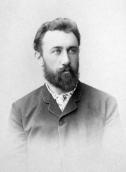Boris Grinchenko
Boris Grinchenko (27.11. (9.12). 1863 – 23.04. (06.05). 1910) – Ukrainian writer, folklorist, translator, teacher, public figure.
Grinchenko’s name is widely known by the "Dictionary of the Ukrainian Language", which has his name. He was one of the most productive Ukrainian cultural figures of the last decades of the 19th – beginning of the 20th centuries.
Grinchenko was born on a farm near Kharkov in a poor noble family.
At the age of sixteen, Grinchenko was arrested for spreading illegal literature. His imprisonment caused significant damage to his health and later led to the development of tuberculosis. He was denied the right to enter secondary school, all further education was independent. By his own efforts he prepared and passed the examination for the rank of People’s Teacher and in 1881 was appointed to a village school.
In the following biography of Grinchenko it is possible to distinguish periods when he taught and worked in small official positions in Luhansk region, Sumy region and in Kherson (1881-1893 biennium), was an employee in Chernihiv Zemstvo (1894-1902 biennium). From 1902 he lived in Kyiv.
Boris Grinchenko died at age 47 in Italy during treatment for tuberculosis. His funeral in Kyiv became a manifestation of national uplift, uniting Ukrainians of different parties and political views.
Grinchenko’s literary debut was made in 1881 on the pages of "Svit" magazine (Lviv), edited by Ivan Franko. During 1884-1893 he published collections of poetry "Songs of Vasyl Chaychenko", "Under the village roof", "New songs and thoughts of Vasyl Chaychenko", "Under a cloudy sky", and a number of his stories were also published.
The main themes of Grinchenko’s early works are the difficult and miserable lives of Ukrainian peasants, mostly uneducated and nationally disoriented.
In the 1890’s, Grinchenko also began working in the drama genre ("Clear Dawns" (1897), "Steppe Guest" (1898), "Amidst the Storm" (1899)). However, to the greatest extent – according to many colleagues and researchers of the author – his literary talent is manifested in great prose, stories. In them, Grinchenko continued the traditions of realism represented by prominent predecessors, Ivan Nechuy-Levytsky and Panas Mirny.
The main characters in the novels "In the Dark Night" (1901) and "Under the Silent Willows" (1902) are brothers who oppose the patriarchal rural environment.
In the history of Ukrainian culture, Boris Grinchenko was included as a spokesman for the Enlightenment, an advocate for the education of the masses. His literary texts have an obvious didactic message.
The history of the reception of Grinchenko’s work and its publication is a vivid illustration of the fundamental changes that the canon of Ukrainian literature has undergone during the 20th century. The years after Grinchenko’s death, the 1910s – 1920s became the apotheosis of his popularity. After 1931, his works were removed from the canon of Ukrainian writing for three decades. Today, his texts have returned to the school curriculum, and his name is again called educational institutions.
Dmitry Esipenko, December 7, 2019.

